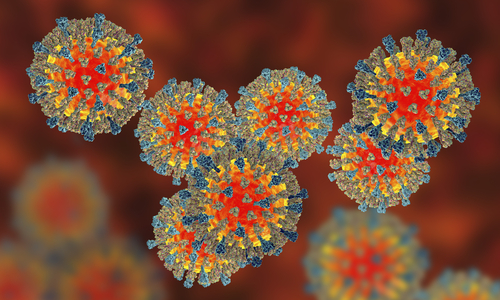EAST LANSING – When Alison Bernstein’s children were infants, she required family members to have a Tdap vaccine booster and a flu shot in order to see them.
The risk was too high not to be strict.
“They were babies and not fully protected with their own vaccines,” she said.
It can be awkward to have conversations about vaccines with other parents, said Bernstein, an assistant professor at Michigan State University who studies Parkinson’s disease.
But they are important conversations to have, given the rise in measles cases — there have been recent outbreaks in Michigan and New York — and persistent misinformation around vaccines.
Shared parental values
Bernstein recommends starting slow. “People who aren’t vaccinating their kids have that same wish as parents who do,” she said. “They want to give their kids the best possible chance and protect them as much as possible from diseases.”
Starting out by focusing on the above mentioned shared parental values is key, said John Besley, a professor of public relations at MSU, who studies scientific communication. So is kindness.
“It doesn’t help to be a jerk,” he said.
He advises parents to talk to other parents about why they chose to vaccinate and the benefits.
“You can talk about why you made your decision, why it makes sense to make that decision and benefits of getting vaccinated,” Besley said.
“There’s hardly any public health intervention in history with as many positive effects as vaccines,” he added.
And sometimes people will hear that better from other parents or from family members, Bernstein said, because of widely propagated conspiracies that doctors and the medical establishment are not to be trusted.
She advises not diving into the science too quickly or deeply. You don’t want people to feel overwhelmed or disconnected.
And she recommends websites like IVaccinate and Voices for Vaccines as good places to get information about the safety and efficacy of vaccines and more scientific resources like those offered by the Center for Disease Control and Preventionand American Academy of Pediatrics for those who want more detail.
What’s behind the rise of vaccine skepticism?
One of the reasons someone could be reluctant to vaccinate is because vaccines have done what they were designed to do. Dangerous diseases such as measles are rare. People no longer see the impact.
“The reason vaccine hesitancy and anti-vax have been able to grow are because our generation hasn’t seen these diseases so we aren’t afraid of them,” Bernstein said.
Between three and four million people a year were infected with the measles virus prior to the development of a vaccine in 1963. Among the nearly 500,000 cases reported to the CDC annually, 450 to 500 people died.
Common symptoms include fever and a rash, but up to one in 20 children with measles get pneumonia and one in every 1,000 develop brain swelling, possibly leading to brain damage.
Another reason people might hesitate to vaccinate is that social media is a breeding ground for unscientific claims.
“The speed at which information good and bad can travel on Facebook and social media works better for pseudoscience than it does for science,” Bernstein said. “If you’re doing pseudoscience, you say whatever and don’t have to back up. Sharing science takes more time because you’re trying to be accurate.”
Which is part of the reason why a long-debunked link between autism and the MMR vaccine persists.
Read the full story here.

